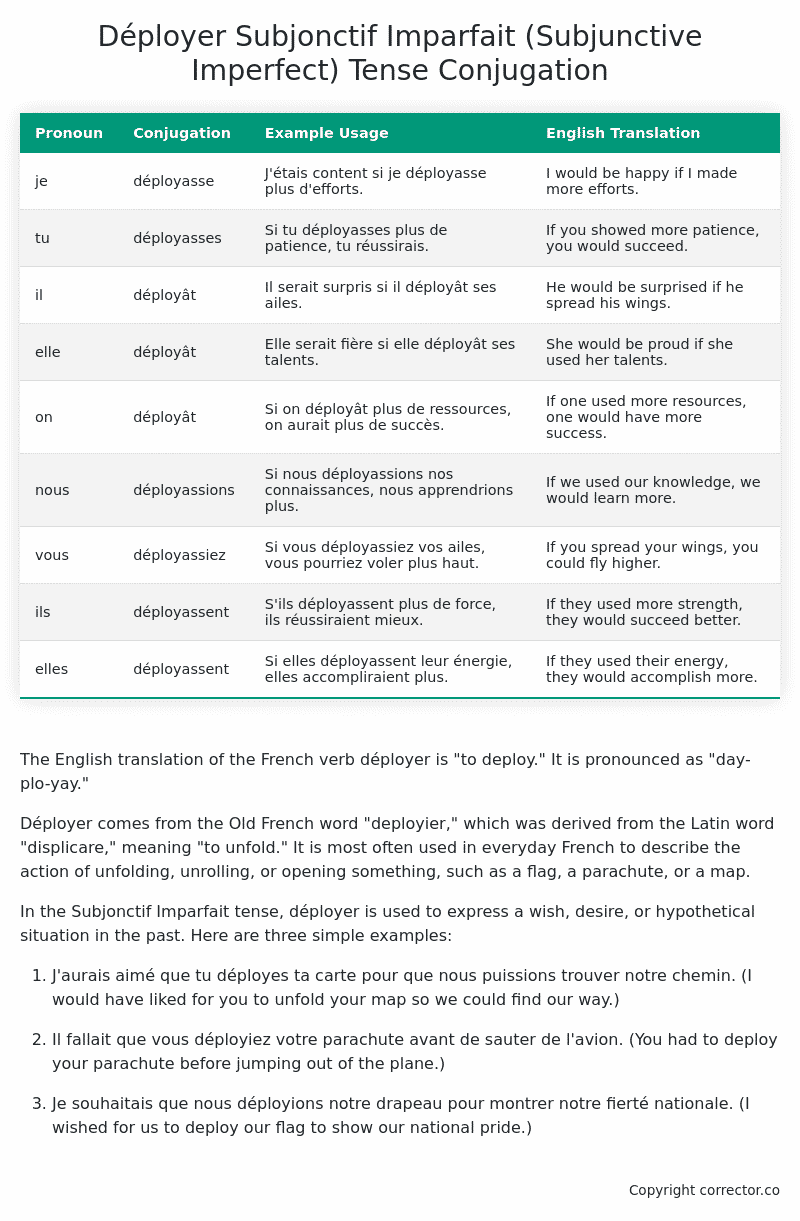Subjonctif Imparfait (Subjunctive Imperfect) Tense Conjugation of the French Verb déployer
Introduction to the verb déployer
The English translation of the French verb déployer is “to deploy.” It is pronounced as “day-plo-yay.”
Déployer comes from the Old French word “deployier,” which was derived from the Latin word “displicare,” meaning “to unfold.” It is most often used in everyday French to describe the action of unfolding, unrolling, or opening something, such as a flag, a parachute, or a map.
In the Subjonctif Imparfait tense, déployer is used to express a wish, desire, or hypothetical situation in the past. Here are three simple examples:
-
J’aurais aimé que tu déployes ta carte pour que nous puissions trouver notre chemin. (I would have liked for you to unfold your map so we could find our way.)
-
Il fallait que vous déployiez votre parachute avant de sauter de l’avion. (You had to deploy your parachute before jumping out of the plane.)
-
Je souhaitais que nous déployions notre drapeau pour montrer notre fierté nationale. (I wished for us to deploy our flag to show our national pride.)
Table of the Subjonctif Imparfait (Subjunctive Imperfect) Tense Conjugation of déployer
| Pronoun | Conjugation | Example Usage | English Translation |
|---|---|---|---|
| je | déployasse | J’étais content si je déployasse plus d’efforts. | I would be happy if I made more efforts. |
| tu | déployasses | Si tu déployasses plus de patience, tu réussirais. | If you showed more patience, you would succeed. |
| il | déployât | Il serait surpris si il déployât ses ailes. | He would be surprised if he spread his wings. |
| elle | déployât | Elle serait fière si elle déployât ses talents. | She would be proud if she used her talents. |
| on | déployât | Si on déployât plus de ressources, on aurait plus de succès. | If one used more resources, one would have more success. |
| nous | déployassions | Si nous déployassions nos connaissances, nous apprendrions plus. | If we used our knowledge, we would learn more. |
| vous | déployassiez | Si vous déployassiez vos ailes, vous pourriez voler plus haut. | If you spread your wings, you could fly higher. |
| ils | déployassent | S’ils déployassent plus de force, ils réussiraient mieux. | If they used more strength, they would succeed better. |
| elles | déployassent | Si elles déployassent leur énergie, elles accompliraient plus. | If they used their energy, they would accomplish more. |
Other Conjugations for Déployer.
Le Present (Present Tense) Conjugation of the French Verb déployer
Imparfait (Imperfect) Tense Conjugation of the French Verb déployer
Passé Simple (Simple Past) Tense Conjugation of the French Verb déployer
Passé Composé (Present Perfect) Tense Conjugation of the French Verb déployer
Futur Simple (Simple Future) Tense Conjugation of the French Verb déployer
Futur Proche (Near Future) Tense Conjugation of the French Verb déployer
Plus-que-parfait (Pluperfect) Tense Conjugation of the French Verb déployer
Passé Antérieur (Past Anterior) Tense Conjugation of the French Verb déployer
Futur Antérieur (Future Anterior) Tense Conjugation of the French Verb déployer
Subjonctif Présent (Subjunctive Present) Tense Conjugation of the French Verb déployer
Subjonctif Passé (Subjunctive Past) Tense Conjugation of the French Verb déployer
Subjonctif Imparfait (Subjunctive Imperfect) Tense Conjugation of the French Verb déployer (this article)
Subjonctif Plus-que-parfait (Subjunctive Pluperfect) Tense Conjugation of the French Verb déployer
Conditionnel Présent (Conditional Present) Tense Conjugation of the French Verb déployer
Conditionnel Passé (Conditional Past) Tense Conjugation of the French Verb déployer
L’impératif Présent (Imperative Present) Tense Conjugation of the French Verb déployer
L’infinitif Présent (Infinitive Present) Tense Conjugation of the French Verb déployer
Struggling with French verbs or the language in general? Why not use our free French Grammar Checker – no registration required!
Get a FREE Download Study Sheet of this Conjugation 🔥
Simply right click the image below, click “save image” and get your free reference for the déployer Subjonctif Imparfait tense conjugation!

Déployer – About the French Subjonctif Imparfait (Subjunctive Imperfect) Tense
Formation
Common Everyday Usage Patterns
Interactions with Other Tenses
Subjonctif Présent
Indicatif Passé Composé
Conditional
Conditional Perfect
Summary
I hope you enjoyed this article on the verb déployer. Still in a learning mood? Check out another TOTALLY random French verb conjugation!


